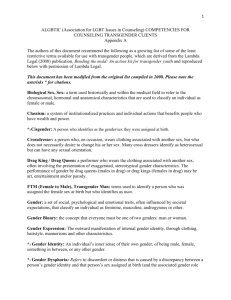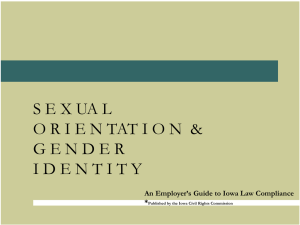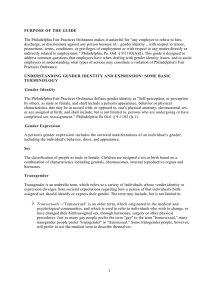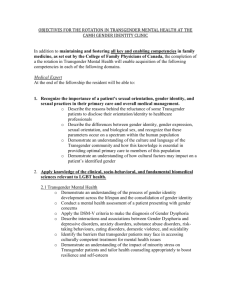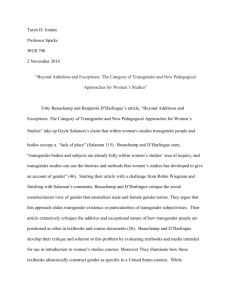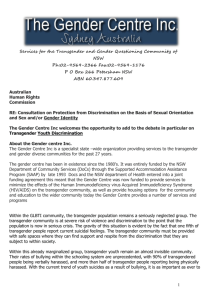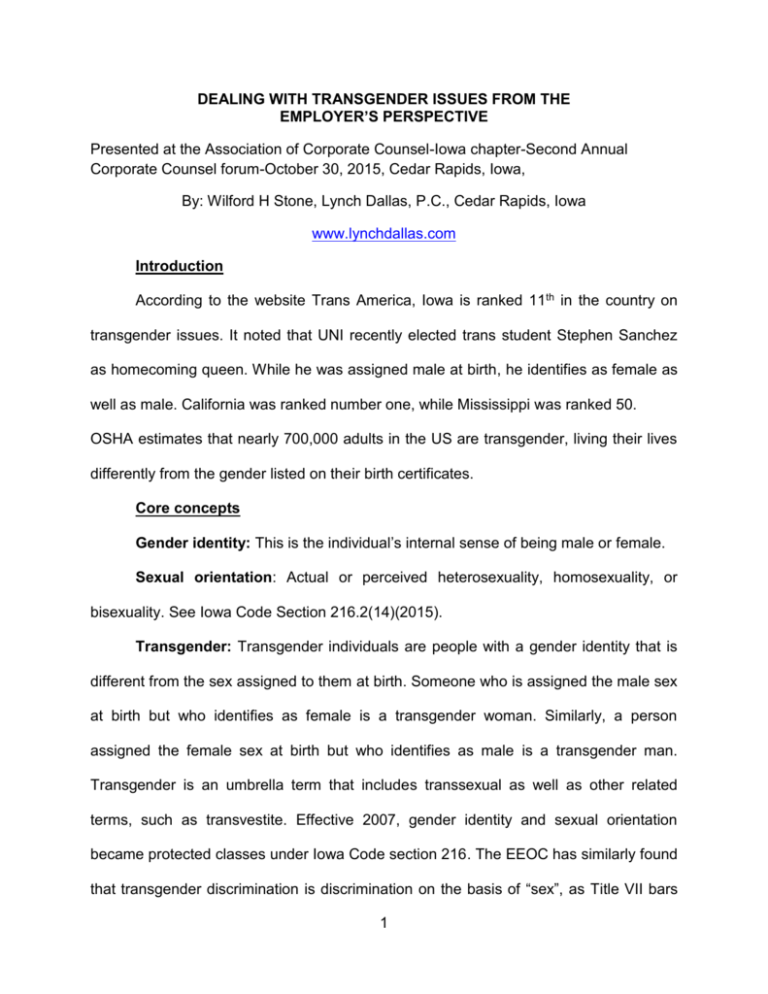
DEALING WITH TRANSGENDER ISSUES FROM THE
EMPLOYER’S PERSPECTIVE
Presented at the Association of Corporate Counsel-Iowa chapter-Second Annual
Corporate Counsel forum-October 30, 2015, Cedar Rapids, Iowa,
By: Wilford H Stone, Lynch Dallas, P.C., Cedar Rapids, Iowa
www.lynchdallas.com
Introduction
According to the website Trans America, Iowa is ranked 11th in the country on
transgender issues. It noted that UNI recently elected trans student Stephen Sanchez
as homecoming queen. While he was assigned male at birth, he identifies as female as
well as male. California was ranked number one, while Mississippi was ranked 50.
OSHA estimates that nearly 700,000 adults in the US are transgender, living their lives
differently from the gender listed on their birth certificates.
Core concepts
Gender identity: This is the individual’s internal sense of being male or female.
Sexual orientation: Actual or perceived heterosexuality, homosexuality, or
bisexuality. See Iowa Code Section 216.2(14)(2015).
Transgender: Transgender individuals are people with a gender identity that is
different from the sex assigned to them at birth. Someone who is assigned the male sex
at birth but who identifies as female is a transgender woman. Similarly, a person
assigned the female sex at birth but who identifies as male is a transgender man.
Transgender is an umbrella term that includes transsexual as well as other related
terms, such as transvestite. Effective 2007, gender identity and sexual orientation
became protected classes under Iowa Code section 216. The EEOC has similarly found
that transgender discrimination is discrimination on the basis of “sex”, as Title VII bars
1
discrimination not only on the basis of biological sex, but because of gender
stereotyping, as well.
Transition: Some employees will find it necessary to transition from living and
working as one gender to another. This may include counseling, hormone therapy,
electrolysis, and sex reassignment surgery. Other employees may not pursue any form
of medical treatment. Both groups are entitled to the same consideration, however, and
should all be treated with dignity and respect in the workplace.
Best practices
1.
Be proactive. Employment attorneys and HR employees recommend a
discussion with the transgendered employee sooner, rather than later, to discuss issues
that might arise at the employer’s workplace, such as dress code, bathroom facilities,
etc. Ignoring the issue and hoping it just goes away is the most common mistake
employers make. Similar to the interactive process in ADA cases, a court is never going
to punish an employer for its efforts to resolve these types of issues in collaboration with
the employee.
2.
Transition while employed. An employee’s transition should be treated
with as much sensitivity and confidentiality as any other employee’s significant life
experiences, such as hospitalization or family difficulties. Work with the employee to
create a transition checklist, including advance preparation, announcement date, and
transition day. There are many resources online to assist employers and employees.
Experience shows that the first few hours on the first day may involve many new
introductions, but that the novelty wears off by midmorning and as people get to know
the person in the new gender role, it will soon become old news. Employers want to
2
discourage gossip and rumor spreading. While general information about the transition
is appropriate, personal information about the employee is confidential and should not
be released without the employee’s prior agreement (i.e., questions regarding the
employee’s medical process, body, and sexuality are inappropriate). Many employers
may want to consider having a third-party trainer or presenter meet with employees to
answer general questions regarding gender identity.
3.
May an employer enforce dress and grooming standards? Yes. Dress
codes are not precluded under Iowa law as long as an employer allows an employee to
appear, groom and dress consistent with the employee’s gender identity. Employers are
urged to evaluate and consider eliminating gender specific dress and appearance rules.
4.
Names and pronouns. Managers and coworkers should use the name
and pronouns appropriate to the gender the employee is now presenting at work.
5.
Does the law require employees to eliminate gender segregated
restrooms? No. It is still legal in Iowa for employers to maintain gender segregated
restrooms. However, employers must permit employees to access those restrooms in
accordance with their gender identity, rather than their assigned sex at birth. Employers
may also want to consider creating a single use restaurant for all employees to use in
addition to gender specific restrooms. Of course, transgender employees should not be
limited to using these single use facilities. June 1, 2015, OSHA issued guidelines
regarding restroom access for transgender employees stating that it considers it a “best
practice” to allow employees to use bathrooms consistent with their everyday gender
identity. See https://www.osha.gov/Publications/OSHA3795.pdf.
3
6.
What about religious objections by coworkers? Coworkers with
religion-based complaints need to understand that the acceptance of a coworker’s
decision to transition has nothing to do with the expectation of changing an individual’s
mind or his religious beliefs. Rather, it is an expectation of inclusion and respect at
work. Employees with religious beliefs and opinions may still hold those opinions in the
workplace, but they should clearly understand the company’s commitment to a
nondiscriminatory and inclusive workforce. When confronted with an employee’s
religious conflict, employer should be open to the employee’s concerns and make
efforts to provide a reasonable accommodation for the employee, while keeping in mind
that the employee is not necessarily entitled to the accommodation of his or her choice.
Courts have acknowledged that the skills needed in today’s increasingly global
marketplace can only be developed to exposure to widely diverse people, cultures,
ideas and viewpoints.” See, e.g., Peterson v. Hewlett-Packard Company, 358 F.3d 599,
606 (9th Cir. 2004).
7.
Harassment will not be condoned. Harassment based on sexual
orientation and gender identity can include malicious conduct, sexual advances, and
intentional misuse of gender specific pronouns. It should not be tolerated and should be
treated like any other form of workplace harassment under company policy.
8.
Recordkeeping and policies.
All employee records (pay accounts,
organization charts, training records, benefits documents, and so on) should be
changed to show the employee's new name and gender, once the employee has begun
working full-time in the gender role consistent with the employee's gender identity and
4
has submitted a request to update his or her records. Similarly, revise anti-harassment
policies to include gender identity and expression as protected classification.
9.
Sick and medical leave. Employees receiving treatment as part of their
transition may use sick leave under applicable regulations. Employees who are qualified
under the Family Medical Leave Act may also be entitled to take medical leave for
transition-related needs of their families.
10.
Hiring process. During the hiring process, hiring managers and
supervisors should be sensitive to the possibility that applicants have transitioned. The
name and gender on the application may correspond with the person's current usage;
however, background or suitability checks may disclose a previous name that indicates
a gender different from the one the applicant is currently presenting. In such cases,
hiring managers should respectfully ask whether the applicant was previously known by
a different name, and confirm with the applicant the name and gender that should be
used throughout the hiring process.
11.
May
an
employer
fire
a
transgendered
employee
for
poor
performance? Yes. An employer is still allowed to fire an employee for
nondiscriminatory reasons, such as poor job performance. Iowa law does not grant
immunity to transgendered employees. It simply ensures that their transgendered status
does not affect the employment decision.
5


